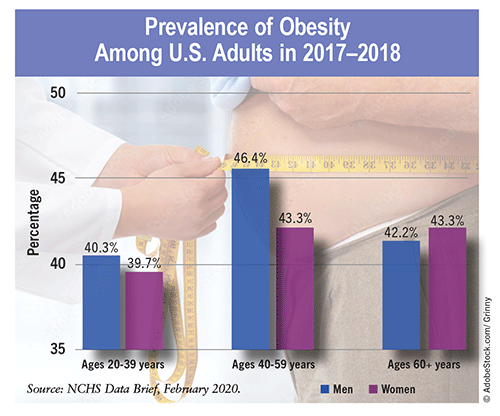US Pharm. 2024;49(6):14.
Obesity is a complex condition that has become a significant global health concern. According to the World Health Organization, obesity affects more than 1 billion individuals worldwide. This estimate includes nearly 650 million adults, 340 million adolescents, and 39 million children. About one-half of all women with obesity live in the United States, China, India, Brazil, Mexico, Russia, Egypt, Indonesia, Iran, Turkey, and Pakistan; one-half of all men with obesity live in the U.S., China, India, Brazil, Mexico, Russia, Egypt, Germany, and Turkey.

Geographical Analysis: Among high-income countries, the U.S. ranks number one in obesity rates. Recent data from the National Center for Health Statistics (NCHS) revealed the age-adjusted prevalence of obesity in the U.S. to be 42.4% (more than 141 million individuals) for 2017–2018, which is an increase from the 30.5% prevalence for 1999–2000. The Behavioral Risk Factor Surveillance System has reported adult obesity rates greater than 35% in 28 states. West Virginia (41%), Louisiana (40.1%), Oklahoma (40%), and Mississippi (39.5%) have the highest rates, whereas the District of Columbia (24.3%), Colorado (25%), and Hawaii (25.9%) have the lowest rates. Annual healthcare costs related to obesity are estimated to be in excess of $173 billion across the country.
Other Demographic Analyses: NCHS data for 2017–2018 found similar prevalence rates of obesity between men and women in the U.S. The lowest rate was in women aged 20 to 39 years (39.7%), and the highest was in men aged 40 to 59 years (46.4%). It also has been found that from 2011–2020, the overall prevalence of obesity increased 4% more in men than in women (34.3% to 41.8% vs. 38.3% to 41.8%, respectively). Among adult men, Hispanic men had the highest rate of obesity (45.7%), followed by non-Hispanic white (44.7%), non-Hispanic black (41.1%), and non-Hispanic Asian men (17.5%). Male students in high school grade levels also had higher obesity rates than their female peers (18.7% vs. 13.7%, respectively).
Health Implications: Obesity can impact the physical, mental, and social well-being of individuals in numerous ways. This condition has been associated with increased risks for high blood pressure, stroke, elevated cholesterol, heart disease, diabetes, asthma, sleep apnea, osteoarthritis, certain cancers, depression, anxiety, and premature death. In men, obesity may also lead to a decrease in testosterone levels, reduced libido, fertility issues, erectile dysfunction, hypogonadism, low self-esteem, difficulties with social interactions and interpersonal relationships, and greater societal pressure for community acceptance. Comprehensive assessments of men with obesity are therefore essential for the provision of holistic approaches to care for overall health and well-being.
The content contained in this article is for informational purposes only. The content is not intended to be a substitute for professional advice. Reliance on any information provided in this article is solely at your own risk.
To comment on this article, contact rdavidson@uspharmacist.com.






